TLR Advocate: July 2009
Lawsuit Reform Alliance Prevails
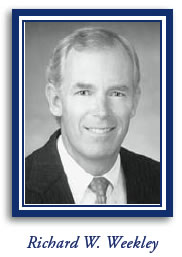
The just-completed 81st Legislative Session is the eighth Session in which TLR has engaged. In some ways, it was our hardest because the trial lawyers, perceiving an opportunity due to changed circumstances in the Legislature, made a broad attack against lawsuit reforms and sound decisions by Texas’ conservative courts. Though we know the trial lawyer attack will continue, we are pleased they were completely unsuccessful in passing legislation this past Session.
TLR was part of a lobbying alliance that included every major business association in Texas. TLR’s own lobby team was tireless and effective. Our lawyers led the legal effort in analyzing bills, drafting amendments, and producing exemplary briefing materials for lawmakers. Our staff and consultants worked ceaselessly for five months. Our top volunteer leadership engaged frequently with decision-makers. TLR supporters from around the State communicated regularly with their state senators and representatives regarding threatening legislation, as did the members and supporters of our allied associations.
It is the Governor and the Legislature, however, who ultimately determine whether bills fail or become law. Once again, Governor Rick Perry proved that he is the strongest lawsuit reform Governor in the country and is extraordinarily committed to a sound civil justice system. Lt. Governor Dewhurst continued providing leadership on lawsuit reform issues in the Senate, and Speaker Joe Straus showed exceptional judgment in his appointments to the House Judiciary & Civil Jurisprudence Committee.
Many legislators provided leadership and critical votes in the Session. To name a few: Senators Joan Huffman and Tommy Williams led the lawsuit reform efforts in the Senate, both in assembling “blocks” that prevented bad bills from getting to the Senate floor and fighting on the floor against the Mesothelioma Causation Bill. Rep. Todd Hunter provided adroit and resolute leadership in his chairmanship of the House Committee and five of his Committee colleagues held firm with him against bad bills. Rep. Carl Isett, in managing the TDI Sunset Bill, worked diligently to prevent that bill, which never reached the House floor, from becoming a vehicle for bad trial lawyer legislation. Eight Democrats, showing true grit, opposed the Entergy Bill on the House floor in spite of tremendous pressure from trial lawyers, who are the leading contributors to the Democratic Party.
We are grateful to our public officials and all of you who made the 81st Legislature a success for our civil justice system.
Richard W. Weekley
Chairman & CEO
Perry Vetoes Bad Bills
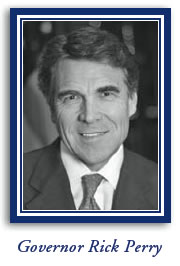
Governor Rick Perry again demonstrated leadership on civil justice issues when he vetoed two pieces of legislation that had been proposed by the personal injury trial bar.
One of the bills would have reversed a correctly decided Texas Supreme Court decision, Fleming Foods, with the result that no citizen would have been able in the future to rely on the plain and unambiguous words of any re-codified statute. Lee Parsley, one of TLR’s lead outside counsel, briefed the Governor’s Office on the perils of the bill (see Lee’s articleon the Fleming Foods veto on page 10 of this Advocate).
Governor Perry also vetoed HB 3485 relating to rural hospitals. The bill’s sponsors, Sen. Robert Duncan (R-Lubbock) and Rep. Garnet Coleman
(D-Houston), allowed the insertion of a troubling provision into HB 3485 at the behest of the Texas Trial Lawyers Association in the waning days of the session. TLR was not informed or consulted regarding this legislation during the Session. TLR joined the Texas Medical Association, The Texas Medical Liability Trust and the Texas Civil Justice League in urging a gubernatorial veto. The Governor’s veto message eloquently explains
why his veto was necessary:
TO ALL TO WHOM THESE PRESENTS SHALL COME:
Pursuant to Article IV, Section 14, of the Texas Constitution, I, Rick Perry, Governor of Texas, do hereby disapprove of and veto House Bill No. 3485 of the 81st Texas Legislature, Regular Session, due to the following objections:
As the husband of a former nurse at a rural hospital, the son-in-law of a rural county physician, and a native of a rural county, I understand the needs of rural hospitals and their patients. I support rural hospitals’ intention of attracting more doctors, and would have been glad to sign a bill allowing them to do so by directly hiring physicians.
However, an amendment added to House Bill No. 3485 late in the session would undermine some of the gains in medical liability reform that have come from caps on physicians’ liability. These reforms were passed in 2003 and approved in a constitutional amendment election. The objectionable provision would increase the liability cap for doctors employed directly by hospital districts, as compared to the bill without the amendment. With respect to doctors employed by hospital districts, this amendment
creates uncertainty as to the applicability of the liability cap available in a single action when multiple doctors or multiple claims are involved.The bill’s provision regarding physician liability was neither debated nor discussed, but rather amended onto this bill late in the session. It risks unraveling the progress we made in curtailing excessive liability and ensuring that patients who need physicians will be able to find them. The 2003 medical liability reform has led to thousands of new doctors coming to Texas. The changes proposed by House Bill No. 3485 threaten the progress that reform has made.
IN TESTIMONY WHEREOF, I have signed my name officially and caused the Seal of the State to be
affixed hereto at Austin, this the 19th day of June, 2009.RICK PERRY
Governor of Texas
A Just Civil Justice System
By Richard J. Trabulsi, Jr., TLR President
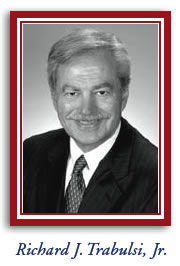
For eight legislative sessions, I have been in the State Capitol advocating for civil justice reforms and against trial-lawyer inspired legislation. TLR’s opponents portray themselves as champions of the ill and injured while attempting to paint us as callous or indifferent to those who have suffered harm. The truth is that public policy must balance empathy for the individual with an objective appraisal of what is best for the people as a whole.
We recognize, in crafting our proposals, that policy makers are often confronted with competing public interests and that they seek a fair balance, with the goal of achieving the greater good for the greater number – and, in tort law, to do so without unreasonably restricting the time-honored rights of those afflicted by personal injury or whose property or business interests have been damaged by wrongful conduct.
TLR works for a civil justice system that is fair, rational, predictable – and just. That means that the civil justice system be designed to allow a claimant to recover damages from those who, in fact, harmed that person. It means, equally importantly, that a defendant who did not cause the harm not be held responsible for the harm.
Tort reform has helped create a business environment in Texas that has produced the strongest state economy in our nation. It also has greatly improved access to health care throughout our State. In contrast to the sensible civil justice system that TLR advocates, with its proven benefits of respect for the law, job growth and access to health care, the civil justice system advocated by the personal injury trial bar is designed to encourage litigation, with adverse effects on economic activity, health care and the public’s perception of the law.
To determine whether our vision of the civil justice system is more just, and does the greater good for the greater number, than that envisioned by the trial bar, let us contrast a TLR-proposed reform that was enacted in 2003 with a failed trial-lawyer proposal in this recent legislative session.
The Omnibus Tort Reform Act of 2003 (HB 4) established a ceiling or “cap” of up to $750,000 in medical liability cases as to non-economic damages, such as mental anguish and pain and suffering. There is no cap on economic damages, such as lost wages and medical expenses, nor do the caps apply to punitive damages in gross negligence malpractice cases. Nevertheless, the trial lawyers allege the cap is unjust because there are cases in which a jury might find that a plaintiff deserves more than the capped amount.
But there is more at stake than the relatively small number of cases in which a jury might award non-economic damages in excess of the cap. On balance, within the framework of the greater good, the limitations on non-economic damages are reasonable. We can verify this because juries today are still allowed to award unlimited dollar amounts for non-economic damages, and they are not informed beforehand that the court will impose caps on the recovery. Significantly, since 2003 juries have rendered very few verdicts awarding non-economic damages higher than the applicable caps. This validates the balance struck by the Legislature in 2003 because the cap and the other medical liability reforms in HB 4 have increased access to high-quality health care throughout our State. Doctors, especially in high-risk specialties such as obstetrics, surgery and emergency care, are now willing to practice in Texas.
So, when judging the impact of the HB 4 medical liability reforms, consider the person who has a trauma injury that is cared for immediately in a locale that now has an emergency care facility because of HB 4. Think of the patient at a Christus Hospital in the Rio Grande Valley who has better rehabilitation facilities because the Hospital’s insurance savings from HB 4 have been invested in improvements. A countless number of Texans have better health care today because of tort reform. It is doing the greater good for the greater number of people.
Next, let us consider the Entergy Bill that plaintiff lawyers proposed in the recent legislative session. Basically, the trial lawyers want to prevent a premises owner from being able to act as its own general contractor in a construction project and cover all workers on the work site with workers’ compensation insurance, thereby receiving tort immunity for work site injuries.
The trial lawyers say that negligence lawsuits should be preserved against a property owner because workers’ compensation benefits are inadequate to compensate a seriously injured worker. But if that is true, the right approach is to improve the workers’ compensation system for all covered workers, rather than crafting a litigation system to favor a few.
What policy provides the best benefit to the greatest number of injured workers? The workers’ compensation system, which has been in place in all fifty states for a century, was a key component of the Progressive Movement of the early 1900s. The guiding principle was to assure immediate payment of the medical expenses and lost income of an injured worker, regardless of whether he or someone else caused his injury.
Compare these benefits to a worker who pursues a lawsuit to get a recovery. Court cases take months or, more typically, years before they are resolved. Unlike recoveries under workers’ compensation, the worker must prove that the defendant’s negligence caused his injury. Should the plaintiff eventually prevail through settlement or judgment, he typically recovers less than 50% of the award because of lawsuit expenses and lawyers’ fees. On construction sites, some workers receive workers’ compensation benefits through their individual employers, but many others work for contractors who do not carry workers’ compensation insurance. In that event, when a worker must resort to a tort lawsuit to seek recovery, he receives nothing for months or years before learning how much compensation, if any, he will receive.
Public policy should, and in fact does, encourage employers to provide workers compensation insurance for workers. The trial-lawyer proposed Entergy Bill would have done the opposite.
I could do a similar analysis on every reform which TLR has advocated and every bill that the trial lawyers have proposed, and I think most reasonable people would conclude that TLR’s proposals are the ones that provide the greater good for the greater number of Texans—without cutting off the legitimate rights of injured parties. ■
Richard J. Trabulsi, Jr.
President
The Mesothelioma Causation Bill:
Shifting the Burden of Proof
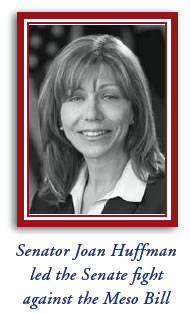
The Mesothelioma Causation Bill was sponsored by Senator Robert Duncan (R-Amarillo) and Rep. Craig Eiland (D-Galveston). Senator Duncan is a defense trial attorney and Rep. Eiland is a personal injury plaintiffs’ lawyer. TLR opposed the Bill because it essentially would have shifted the burden of proof from the plaintiff to the defendant in mesothelioma cases. In supporting the legislation, personal injury trial lawyers tried to get the Legislature to substitute its judgment for that of the courts regarding standards relating to proximate cause and scientific evidence.
The Policy Issues
Mesothelioma is a terrible, deadly disease. It is usually caused by exposure to asbestos, especially in men, but it often has no known cause, especially among women. Everyone agrees that a mesothelioma claimant is entitled to compensation from any defendant who caused that disease. Trial lawyers were trying to reverse the 8-0 Texas Supreme Court opinion in Borg-Warner v. Flores, which set the evidentiary standard of causation that a claimant must meet to show that a particular defendant was a proximate cause of the claimant’s asbestos-related disease.
In his opinion in Borg-Warner, Chief Justice Wallace Jefferson discussed the complex issue of whether a particular defendant’s product or conduct was a cause of a claimant’s disease:
“In a case like this, proof of mere frequency,
regularity, and proximity is necessary but not
sufficient, as it provides none of the quantitative
information necessary to support causation
under Texas law.”
“Thus substantial-factor causation, which separates
the speculative from the probable, need not
be reduced to mathematical precision. Defendantspecific
evidence relating to the approximate dose
to which the plaintiff was exposed, coupled with
evidence that the dose was a substantial factor in
causing the asbestos-related disease, will suffice.”
Claimants have received large settlements and judgments in Texas, both before and after the Borg-Warner decision. TLR opposed the bill because it would have denied an innocent defendant—in lawsuits in which claimants routinely sue 40 to 100 defendants—a reasonable opportunity to extricate itself from the litigation in a timely manner. We also opposed the Bill because we believe causation and scientific evidence standards are best developed in the common law tradition of case by case determination by judges.
The Legislative Battle – The Senate
Senator Duncan is Chairman of the Senate State Affairs Committee. The Committee reported out the Bill and it reached the Senate floor, where it was vigorously debated. Senator Joan Huffman (R-Houston), a former prosecutor and criminal court judge, led the floor opposition to the bill. In a remarkable performance for a freshman Senator, she debated the veteran Senator Duncan with patience and skill. She was joined by Senator Tommy Williams (R-The Woodlands), who made solid points about the negative impact that the bill would have on our State’s economy at a time of financial peril. Senator Dan Patrick (R-Houston) raised the worthy question of why plaintiff lawyers handling mesothelioma claims are entitled to 40% or more of settlements and judgments since these lawsuits are practically risk-free lawsuits on the part of the claimants.
Senators Bob Deuell (R-Greenville) and Robert Nichols (R-Jacksonville) also spoke forcefully against the Bill. Joining these five Senators in voting against the Bill were Senators Craig Estes (R-Wichita Falls), Troy
Fraser (R-Horseshoe Bay), Glenn Hegar, Jr. (R-Katy),
Mike Jackson (R-La Porte), Jane Nelson (R-Lewisville)
and Florence Shapiro (R-Plano). Nevertheless, the Bill
passed the Senate with all twelve Democratic Senators
voting for the Bill. The fight against the Bill then moved
to the House.
The Legislative Battle –The House of Representatives
In the House of Representatives, the Bill that passed the Senate was referred to the House Judiciary and Civil Jurisprudence Committee, where it received a thorough public hearing. Chairman Todd Hunter met with the
trial lawyers advocating the Bill and with Senate Sponsor Robert Duncan. After careful consideration, he and a majority of the House Committee opposed the Bill and refused to report it out of Committee.
The Committee majority opposing the Bill was comprised of Chairman Todd Hunter (R-Corpus Christi) and Representatives Dan Branch (R-Dallas), Jim Jackson (R-Carrollton), Tryon Lewis (R-Odessa), Jerry Madden (R-Plano) and Beverly Woolley (R-Houston).
The Committee Members who actively supported the Bill were Representatives Bryan Hughes (R-Mineola), Roberto Alonzo (D-Dallas) and David Leibowitz (D-San Antonio). Representatives Hughes and Leibowitz are personal injury trial lawyers. Having been not reported from Committee, the Bill died in the House. ■
The Entergy Bill —
Bad for Business & Bad for Workers
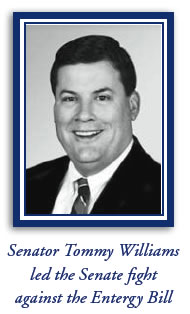
TLR opposed the Entergy Bill sponsored by Senator Robert Duncan (R-Lubbock) and Rep. Helen Giddings (D-Dallas) because it would have reversed a decadesold policy supporting workers’ compensation and allowed trial lawyers to exploit third-party lawsuits against property owners.
The Policy Issues
The Texas Supreme Court’s ruling in the Entergy case is that a premises owner can act as his own general
contractor and purchase a comprehensive workers’ compensation policy to cover his employees and those of subcontractors working on his property. The decision supports the explicit policy of Texas and
every other state to encourage workers’ compensation coverage – a policy that has been in place for almost a hundred years.
Workers’ compensation allows an injured worker to receive lost wages and all medical expenses without the delay and risk of negligence lawsuits. To encourage employers to provide workers’ compensation, the
employer receives immunity from tort lawsuits for the injury.
Since the Entergy decision supported good public policy, TLR opposed the legislation that would reverse it. TLR also opposed the Entergy Bill because it would have discouraged construction activity, which produces good-paying jobs for Texans and adds to our ad valorem tax base to fund essential government services. The Bill would have been a particularly bad move for our State in these challenging economic times.
The Legislative Battle – The House of Representatives
The Entergy Bill was reported out of the House Business and Industry Committee under pressure from Chairman Joe Deshotel (D-Beaumont), who is associated with the law firm of Wayne Reaud, one of the five Texas masstort lawyers who shared in the $3.3 billion fee from former
Texas Attorney General and convicted felon, Dan Morales, in the national tobacco settlement.
The Bill was vigorously debated on the House floor. Leading the floor opposition to the Bill were Representatives Larry Phillips (R-Sherman), Phil King (R-Weatherford), Tim Kleinschmidt (R-Lexington) and Byron Cook (R-Corsicana). Rep. Tryon Lewis (R-Odessa), who served as a State District Judge for 21 years, gave an eloquent speech against the Bill when it was heard on Third Reading. Other Representatives who spoke against the Entergy Bill were Dennis Bonnen (R-Angleton), Wayne Christian(R-Center), Jerry Madden (R-Richardson) and Larry Taylor (R-Friendswood).
The leading floor advocates for the Bill, in addition to its sponsor, were Representatives Dan Gattis (R-Georgetown), John Smithee (R-Amarillo) and Burt Solomons (R-Carrollton). Representatives Gattis and Smithee are trial attorneys. Admirably, eight Democratic Members voted against the bill, resisting enormous pressure from trial lawyers, labor unions and several of their most liberal House colleagues. They showed intellectual integrity and political courage in standing up for principle and for the worker protections provided by the workers’ compensation system. The Democrats who voted against the Bill are Representatives Chuck Hopson (Jacksonville), Eddie Lucio, III (Brownsville), Marisa Marquez (El Paso), Patrick Rose (Dripping Springs), Tara Rios Ybarra (South Padre Island), and Mark Strama (Austin). The Democrats who opposed the bill by not voting on it at all are Representatives Ryan Guillen (Rio Grande City) and Aaron Pena (Edinburg).
Unfortunately, the Bill passed on Third Reading by a 73 to 71 vote and was sent to the Senate.
Legislative Battle – The Senate
When the Bill got to the Senate near the end of the Session, it was dead on arrival due to the work of Senators Joan Huffman (R-Houston) and Tommy Williams (R-The Woodlands) in building a strong group of Senators who would refuse to suspend the rules to allow the Bill to reach the Senate floor. While the Bill was reported out of Chairman Duncan’s State Affairs Committee, it never made it to the floor of the Senate.
The Senators who prevented the Bill from going to the floor are, in addition to Senators Huffman and Williams: Democratic Senator Eddie Lucio, Jr. (Brownsville) and Republican Senators Bob Deuell (Greenville), Kevin Eltife (Tyler), Craig Estes (Wichita Falls), Troy Fraser (Horseshoe Bay), Glenn Hegar, Jr. (Katy), Mike Jackson (La Porte), Jane Nelson (Lewisville), Robert Nichols (Jacksonville), Steve Ogden (Bryan), Dan Patrick (Houston), Kel Seliger (Amarillo) and Florence Shapiro (Plano). ■
The Paid Or Incurred Bill:
Saying No to “Phantom Damages”
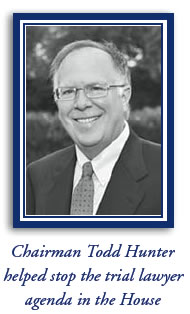
The Paid or Incurred Bill was sponsored by Senator Chuy Hinojosa (D-Mission) and Rep. John Smithee (R-Amarillo), both of whom are trial attorneys. TLR opposed the Bill because it would have repealed a key lawsuit reform enacted in 2003 and would have allowed personal injury trial lawyers to sue for medical “expenses” that had not been paid and were not owed to anyone – “phantom damages.”
The Policy Issues
Trial lawyers who proposed this legislation wanted to change the current law to enable a plaintiff to recover as damages the full amount of billed medical expenses without regard to what was actually paid or is owed on those medical bills. This violates common sense and the legal concept of economic damages.
Economic damages mean “compensatory damages for any pecuniary loss or damages.” The intent is to reimburse a claimant for actual economic loss, such as property damage, lost wages, or medical bills paid or owed.
The current “paid or incurred” provision is part of the Omnibus Tort Reform Act of 2003 (HB 4). It allows a plaintiff to recover as economic damages all legitimate health care expenses, including:
• All out-of-pocket medical expenses paid by the plaintiff on her own behalf, including the amount paid as a deductible on her insurance policy.
• All medical expenses paid by a third party on behalf of the plaintiff, such as hospital bills paid by a health insurance carrier.
• All amounts of a medical provider’s bill which are owed by or on behalf of the plaintiff.
• All estimated future medical expenses.
Doctors, hospitals and other medical providers have different payment rates for various insurance carriers and government agencies. Medical providers use “sticker price” billing at rates that they do not expect to collect. In opposing the bill, TLR argued that our courts should not be compelled to award damages for these over-charges, which are not paid and are not owed by anyone to anyone, just because of the peculiarity of modern medical billing.
The Legislative Battle – The Senate
The Paid or Incurred Bill never made it to the floor of either the Senate or the House. To get a bill to the floor of the Senate requires two-thirds of the Senators to agree to consider the bill on the floor. Senator Joan Huffman (R-Houston) and Senator Tommy Williams (R-The Woodlands) led the
effort to prevent the Bill from reaching the Senate floor. Joining Senators Huffman and Williams in blocking the Bill were Senators John Carona (R-Dallas), Bob Deuell (R-Greenville), Craig Estes (R-Wichita Falls), Troy Fraser (R-Horseshoe Bay), Mike Jackson (R-La Porte), Jane Nelson (R-Lewisville), Robert Nichols (R-Jacksonville), Dan Patrick (R-Houston), Kel Seliger (R-Amarillo), and Florence Shapiro (R-Plano).
The Legislative Battle –The House of Repr esentatives
In the House, the Bill never emerged from the House Judiciary and Civil Jurisprudence Committee. A majority of the Committee’s Members opposed the Bill: Chairman Todd Hunter (R-Corpus Christi) and Representatives Dan Branch (R-Dallas), Jim Jackson (R-Carrollton), Tryon Lewis (R-Odessa), Jerry Madden (R-Plano), and Beverly Woolley (R-Houston) opposed the Bill and refused to report it out of Committee.
The Committee Members who actively supported the Bill were Representatives Bryan Hughes (R-Mineola), Roberto Alonzo (D-Dallas) and David Leibowitz (D-San Antonio). Representatives Hughes and Leibowitz are personal injury trial lawyers.
Barratry Legislation Gutted
By Hugh Rice Kelly, TLR General Counsel
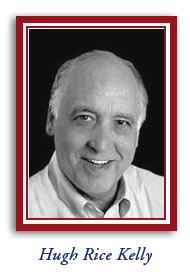
Reform proposals that would have put teeth into laws against illegal lawsuit solicitation – commonly called barratry and more crudely described as “ambulance chasing” – unfortunately were defeated in the 2009 legislative session.
The Senate version of HB 148, which was quietly gutted near the end of the legislative session, would
have empowered clients to collect triple damages from lawyers who engage in illegal case solicitation. This civil remedy would have penalized such practices as lawyers using “runners” to covertly solicit cases or to otherwise exploit the vulnerability of hospitalized accident victims and their families. The new civil treble damage claim would also have applied to private investigators, chiropractors, doctors, and other health care workers who participated in the illegal solicitation of cases.
Also removed were civil triple damage claims penalizing solicitations involving false, fraudulent, misleading, deceptive, or unfair statements or claims, or that included coercion, duress, overreaching, harassment,
intimidation, or undue influence.
In an unusual move, the Texas Trial Lawyers Association publicly announced its support for legislation adding strong civil remedies for violations of the TexasBar disciplinary rules, but their allies in the Legislature worked behind the scenes to kill the legislation.
Brazen case solicitation has been practiced with impunity in some parts of Texas for years, particularly in South Texas. The San Antonio Express-News reported in May that the situation there has grown so severe that “warfare has broken out over barratry” in Corpus Christi. The paper reported that “lawyers are suing lawyers, seeking to overturn multimillion-dollar settlements of cases they claim were acquired improperly.”
In that news report, Bill Edwards, a well-known Corpus Christi plaintiff lawyer, characterized the situation as “really terrible” and promised that “I will take a case for anyone who wants to sue a lawyer who illegally obtained a case. I don’t care who the lawyer is.” Edwards and others
expressed the view that barratry plays a part in most major personal injury cases in South Texas, including the illegal payment of thousands of dollars in up-front cash to clients who sign representation contracts.
The key provision of HB 148 was its enhancement of the right of clients to recover civil damages from dishonest lawyers and their runners. These critical civil law provisions were removed, limiting HB 148 to minor textual changes to existing criminal barratry laws. This final version of HB 148 was complemented by HB 3515, an equally meaningless bill purporting to penalize lawyers who fail to report that non-lawyer runners have been involved in a case. History has proven that tinkering with criminal statutes outlawing barratry is a pointless exercise: penal code provisions outlawing barratry have been on the books for years, but have proven totally ineffective.
Even stronger than the Senate version of HB 148 was House Bill 3915. Authored by Republican Representative Allen Fletcher of Houston, HB 3915 would have expanded the client’s civil cause of action to cover all unethical practices by attorneys in contingent-fee cases, rather than focusing only on barratry violations. The Texas Trial Lawyers Association witness expressly endorsed Rep. Fletcher’s bill in testimony before the House Judiciary & Civil Jurisprudence Committee. Meanwhile, however, Capitol insiders were told that TTLA lobbyists quietly lined up enough votes to kill the bill in Committee.
Successful treble damage claimants under the two strong reform bills would also have recovered their attorneys’ fees for pursuing their claims, thereby applying the usual pattern of Texas consumer protection laws to wrongdoing by dishonest attorneys.
TLR Honor Roll —
81ST LEGISLATIVE SESSION
Governor Rick Perry is a stalwart on civil justice issues. The Governor has been a leader in accomplishing the most comprehensive tort reform in our nation’s history and he consistently appoints judges who are conservative, accomplished and honest. The Legislature was confident that he would veto any bad civil justice legislation that found its way to his desk, and he did.
Lt. Governor David Dewhurst actively helped pass major reforms in 2003 and 2005 and gave tort reformers fair treatment this Session. He approaches every major issue with careful study and thought.
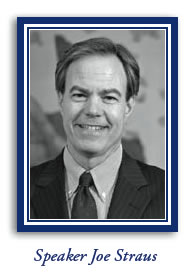
Speaker Joe Straus exercised exceptional judgment in his appointments to the House Judiciary and Civil Jurisprudence Committee. As a Member, he has always supported civil justice reform and is quoted frequently in the press praising tort reform’s positive impact on the business climate in Texas.
Senators Joan Huffman and Tommy Williams led the opposition in the Senate to the myriad of bad bills that were introduced this year, and were instrumental in the ultimate defeat of the three major trial-lawyer inspired bills.
Senators Bob Deuell, Craig Estes, Troy Fraser, Mike Jackson, Jane Nelson, Robert Nichols, Dan Patrick and Florence Shapiro were opposed to each of the three major trial-lawyer inspired bills: Mesothelioma Causation, Paid or Incurred and Entergy. Troy Fraser was prepared to filibuster the Entergy Bill if it had reached the Senate floor.
Senator Kel Seliger was a “blocker” on both the Paid or Incurred and Entergy Bills. Senator Glenn Hegar, Jr. voted against the Mesothelioma Bill on the Senate floor, was a blocker against the Entergy Bill and, as
sponsor of various Sunset bills, was committed to keep them free of harmful civil justice provisions that trial lawyers wanted to attach to those bills.
Senator Eddie Lucio, Jr. was the sole Senate Democrat to oppose the Entergy Bill, thereby reaffirming his traditional support of a fair and balanced civil justice system. He has witnessed first hand how tort reform has greatly enhanced access to health care and improved job creation in the Rio Grande Valley.
Rep. Todd Hunter, Chairman of the House Judiciary and Civil Jurisprudence Committee, stood up to relentless pressure by personal injury trial lawyers.
Rep. Jim Dunnam (D-Waco), a personal injury plaintiffs’
lawyer, undertook a vendetta against Chairman Hunter, using procedural maneuvers to try to kill bills important to Chairman Hunter’s district. Chairman Hunter handled matters with grace and good humor and provided wise and courageous leadership as Chairman of the House Committee that handled most of the civil justice bills.
Representatives Dan Branch, Jim Jackson, Tryon Lewis, Jerry Madden and Beverly Woolley stood firm with Chairman Hunter to prevent the Mesothelioma Causation Bill and the Paid or Incurred Bill from being reported out of the House Judiciary and Civil Jurisprudence Committee, thereby killing those bad bills.
Eight Democratic Representatives opposed the Entergy Bill: Chuck Hopson, Eddie Lucio, III , Marisa Marquez, Tara Rios Ybarra, Patrick Rose, and Mark Strama voted against the Entergy Bill on the House floor. Representatives Ryan Guillen and Aaron Pena absented themselves from the vote rather than vote for the Bill. These Democrats resisted enormous pressure from the major funders of the Democratic Party – the personal injury trial lawyers. They were also heavily lobbied by some of their House Democratic colleagues who are themselves trial lawyers or are closely tied to trial lawyers. These eight Democrats had the courage and independence to do what they believed was right.
Representatives Kelly Hancock, Linda Harper-Brown, Geanie Morrison, Tan Parker and Larry Taylor organized the Republican Caucus to oppose the Entergy Bill on the House floor. Only seven Republicans voted with the trial lawyers in supporting the Bill: Joe Crabb, Dan Gattis, Tuffy Hamilton, Bryan Hughes, Todd Smith, John Smithee and Burt Solomons. Of those, all are lawyers except Rep. Hamilton.
Representatives Byron Cook, Phil King, Tim Kleinschmidt, Tryon Lewis and Larry Phillips made the major arguments against the Entergy Bill on the House floor. Others who took the microphone to oppose the Bill were Representatives Dennis Bonnen, Wayne Christian, Jerry Madden and Larry Taylor.
Representative Carl Isett, sponsor of the Texas Department of Insurance Sunset Bill, was committed to keep that and other Sunset bills free of trial-lawyer inspired provisions related to the civil justice system.
Legislative Staffers on the Committees and in the Members’ offices work hard, study carefully, and have an open door to listen to our pleas and concerns. They are an unheralded treasure of our civil society who do not get the recognition they deserve.
Our Allies in the trenches of legislative advocacy, who
signed joint communications to legislators:
Associated Builders and Contractors of Texas
Associated General Contractors: Texas Building Branch
Association of Electric Companies of Texas
National Federation of Independent Business/Texas
Pharmaceutical Research and Manufacturers of America
Technology Association of America
Texas Association of Business
Texas Association of Manufacturers
Texas Association for Patient Access
Texas Chemical Council
Texas Civil Justice League
Texas Oil and Gas Association
Texas Prosperity Project
Texas Retailers Association
17,000 TLR Supporters from all over Texas, many of whom communicated directly with their legislators during the Session.
The TLR Lawyers who worked around the clock during the Session, Mike Hull and Lee Parsley. Assisting them were Bryce Benjet, James Caruthers, Jim Davis, Dylan Drummond, Andrew McRae and Gardner Pate.
The TLR Lobby Team, an exceptionally gifted and dedicated group: Joe Garcia, Jim Grace, Ed Lopez, Bill Messer, David Sibley, Keith Strama, Sherry Sylvester, Mary Tipps, Mike Toomey and Michelle Wittenburg.
The TLR Staff and Consultants, who are the best in the business of public policy advocacy: Denis Calabrese, Glenda Hovey, Stewart Jarmon, Beverly Kishpaugh, Sherry Sylvester, Mary Tipps and Kristie Vazquez. ■
Governor Perry Vetoes
SB 2038 — The Fleming Foods Bill
By Lee Parsley, TLR Counsel
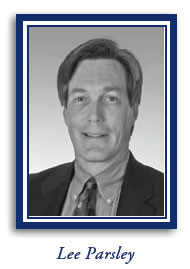
Showing his lawsuit reform leadership and willingness to “do the right thing,” Governor Rick Perry vetoed SB 2038, sponsored by Sen. Robert Duncan (R-Lubbock) and Rep. Will Hartnett (R-Dallas), both of whom are trial attorneys.
The Texas Trial Lawyers and their allies were the proponents of SB 2038. The bill related to re-codification statutes and would have required the Texas Supreme Court to give a statute the meaning that it would have been given before it was moved into a subject-matter code, notwithstanding the repeal of the prior statute and
notwithstanding any omission or change in the statute that was irreconcilable with the prior version of the statute. In other words, under this bill, the plain meaning of a statute no longer could be counted on to be the actual meaning of that statute!
Governor Perry recognized the foolishness of saying that extant statutes should not be given their plain, unambiguous meaning, so he correctly vetoed the bill.
A brief history of statutory re-codification demonstrates why Governor Perry was right.
Before 1963, Texas statutory law was organized alphabetically. Laws regarding “agriculture” appeared in the books ahead of laws regarding “attorneys,” for example. This organizational system fragmented the statutes and made it difficult to use the State’s statutory law.
In 1963, the Legislature passed a law requiring the Texas Legislative Council (TLC) to make proposals to the Legislature for reorganizing Texas law into broad subject-matter codes so that it would be more accessible to the citizens of the State, but the 1963 statute implementing the codification process was somewhat contradictory. On the one hand, TLC was supposed to rewrite the statutes to clarify the law. On the other hand, TLC was not supposed to make substantive changes to the law. It is easy to imagine the difficulty in rewriting statutory language, some of which was 50 or more years old, without making any substantive change.
In 1999, the Texas Supreme Court handed down an opinion in Fleming Foods v. Rylander. In that case, the Court found that a provision in the Tax Code unambiguously allowed a taxpayer to seek a refund from the Comptroller, while the predecessor statute that was repealed when the Tax Code was adopted would not have allowed the taxpayer to seek a refund. The Court stated its dilemma: “We are thus faced with a difficult issue. What effect should be given to clear, unambiguous statutes that were drafted by the Legislative Council as part of the codification process but that depart from prior law?”
After careful analysis, the Court properly concluded: “…that when, as here, specific provisions of a ‘nonsubstantive’ codification and the code as a whole are direct, unambiguous, and cannot be reconciled with prior law, the codification rather than the prior, repealed statute must be given effect.” In other words, the Court concluded that the laws “on the books” must mean what they plainly say. The Governor’s veto of SB 2038 allows this sound decision by the Supreme Court to stand.
